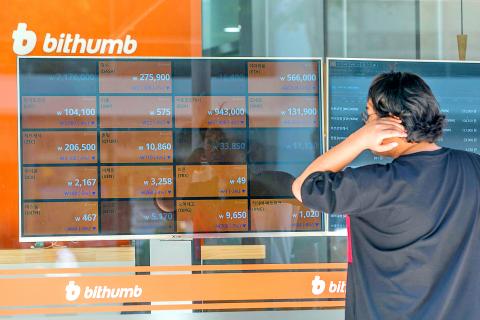Cryptocurrencies dropped after the second South Korean exchange in as many weeks said it was the victim of a theft, renewing concerns about the safety of digital-asset trading venues.
Bithumb, ranked No. 7 globally by traded value on Coinmarketcap.com, yesterday said that hackers stole about 35 billion won (US$31.6 million) and that Ripple was among the coins taken.
The exchange halted cryptocurrency deposits and withdrawals, said it would compensate victims and moved investor assets to a so-called cold wallet, which is disconnected from the Internet and less vulnerable to theft.

Photo: Bloomberg
Bitcoin, the largest cryptocurrency, dropped as much as 2 percent and was trading at US$6,616 as of 8:25am in London, bringing this year’s decline to 54 percent, according to Bloomberg composite pricing.
Ripple, Ethereum and Litecoin also retreated, along with some Asia-listed stocks with exposure to digital currencies.
Enthusiasm for virtual currencies has waned this year partly due to a string of heists, including the nearly US$500 million theft from Japanese exchange Coincheck Inc in late January.
South Korean venue Coinrail last week said that some of the exchange’s digital coins appeared to have been stolen, although it did not disclose the amount.
While news of the latest theft has weighed on sentiment, the reaction has been relatively subdued, said Ryan Rabaglia, head trader at cryptocurrency dealing firm Octagon Strategy Ltd in Hong Kong.
“The market has sort of become a bit more battle-hardened. It can weather the storm on these negative reports,” he said.
The crypto-mania that spread worldwide last year was particularly intense in South Korea, with Bitcoin prices at one point climbing to a 50 percent premium over those in the US.
The speculative fervor has since cooled amid a government crackdown, but South Korean exchanges are still among the world’s most active.
South Korean policymakers are debating comprehensive regulations covering cryptocurrencies, with proposals ranging from shutting down local exchanges to allowing them to operate under increased supervision.
Bithumb said that it reported the theft to the Korea Internet & Security Agency and that officials there are investigating.
The South Korean hacks show “how ill-prepared a lot of the exchanges still are across large markets,” said Vijay Ayyar, the Singapore-based head of business development at Luno, a cryptocurrency exchange.
“The overall market is seeing a lot of regulatory action and incidents like these will only hasten the process,” he added.

Nvidia Corp chief executive officer Jensen Huang (黃仁勳) on Monday introduced the company’s latest supercomputer platform, featuring six new chips made by Taiwan Semiconductor Manufacturing Co (TSMC, 台積電), saying that it is now “in full production.” “If Vera Rubin is going to be in time for this year, it must be in production by now, and so, today I can tell you that Vera Rubin is in full production,” Huang said during his keynote speech at CES in Las Vegas. The rollout of six concurrent chips for Vera Rubin — the company’s next-generation artificial intelligence (AI) computing platform — marks a strategic

REVENUE PERFORMANCE: Cloud and network products, and electronic components saw strong increases, while smart consumer electronics and computing products fell Hon Hai Precision Industry Co (鴻海精密) yesterday posted 26.51 percent quarterly growth in revenue for last quarter to NT$2.6 trillion (US$82.44 billion), the strongest on record for the period and above expectations, but the company forecast a slight revenue dip this quarter due to seasonal factors. On an annual basis, revenue last quarter grew 22.07 percent, the company said. Analysts on average estimated about NT$2.4 trillion increase. Hon Hai, which assembles servers for Nvidia Corp and iPhones for Apple Inc, is expanding its capacity in the US, adding artificial intelligence (AI) server production in Wisconsin and Texas, where it operates established campuses. This

US President Donald Trump on Friday blocked US photonics firm HieFo Corp’s US$3 million acquisition of assets in New Jersey-based aerospace and defense specialist Emcore Corp, citing national security and China-related concerns. In an order released by the White House, Trump said HieFo was “controlled by a citizen of the People’s Republic of China” and that its 2024 acquisition of Emcore’s businesses led the US president to believe that it might “take action that threatens to impair the national security of the United States.” The order did not name the person or detail Trump’s concerns. “The Transaction is hereby prohibited,”

Garment maker Makalot Industrial Co (聚陽) yesterday reported lower-than-expected fourth-quarter revenue of NT$7.93 billion (US$251.44 million), down 9.48 percent from NT$8.76 billion a year earlier. On a quarterly basis, revenue fell 10.83 percent from NT$8.89 billion, company data showed. The figure was also lower than market expectations of NT$8.05 billion, according to data compiled by Yuanta Securities Investment and Consulting Co (元大投顧), which had projected NT$8.22 billion. Makalot’s revenue this quarter would likely increase by a mid-teens percentage as the industry is entering its high season, Yuanta said. Overall, Makalot’s revenue last year totaled NT$34.43 billion, down 3.08 percent from its record NT$35.52